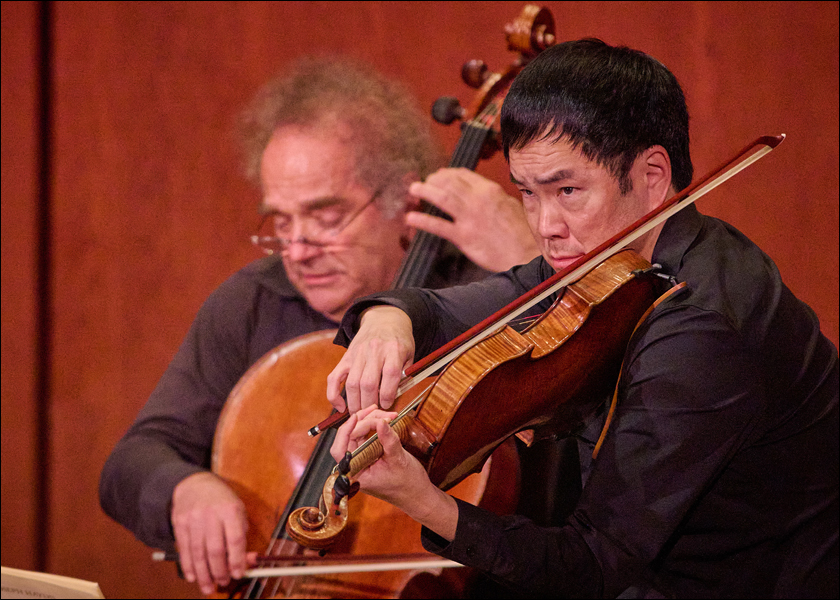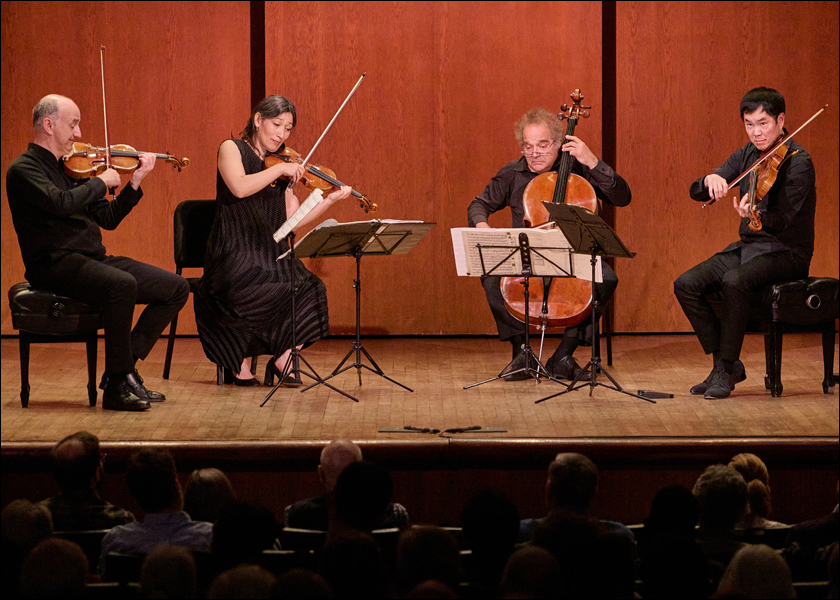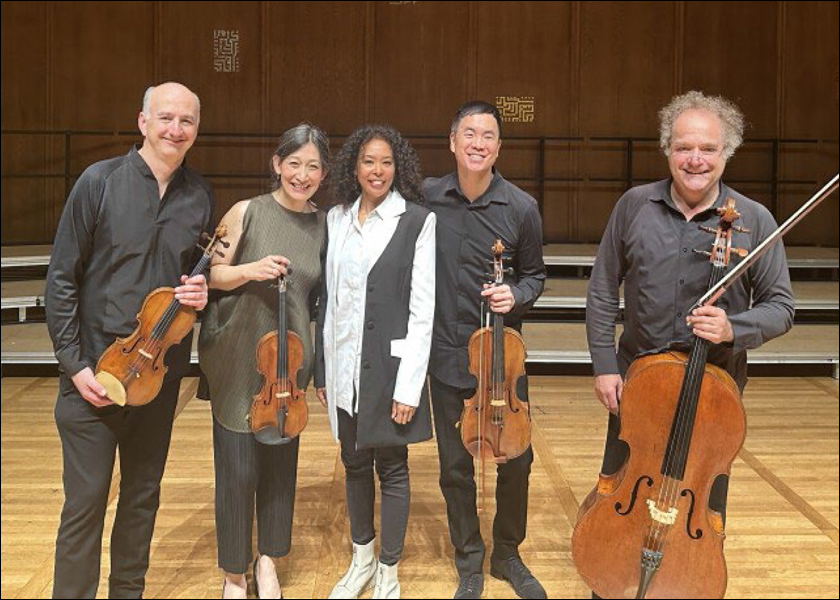Korean American violist Richard O’Neill finds the “flow” in new music | By Anne Holzman (Spring 2024)

When the Takács Quartet takes the stage at the 92nd Street Y in New York City on March 13, concertgoers will be treated to the area premiere of Flow by composer Nokuthula Endo Ngwenyama. They will hear the whispers and bangs of the universe as Ngwenyama, known to the group by the nickname Tula, puts their 16 strings to work evoking the music of the spheres.
Freshly-composed music has not always been in the quartet’s wheelhouse; they made their name back in the 1980s and ‘90s as some of the most interesting interpreters of the standard classical repertoire. But for their current violist, Korean American Richard Yongjae O’Neill, new music has been a passion and a career.
O’Neill, born and raised in the Seattle area, moved to Manhattan in August 2001 to start his master’s work in viola performance at the famous Juilliard School for musical performance in New York City. He quickly befriended cello professor Fred Sherry, who hired O’Neill for gigs around town.
“I think Fred literally knows all of the living composers,” O’Neill told KQ during an interview in early March. O’Neill discovered that he enjoyed the adventure of tackling unknown scores. “I’m very grateful for that period,” he said.
Around the time he started at Juilliard, he and his mother, who had left a chaotic South Korea in the wake of the war, were trying to reconnect with relatives who they thought might be somewhere in Korea. They traveled to the country, made videos about themselves, and appeared on Korean television shows.
In spite of a few hopeful meetings with families, Richard and his mother had no success at finding their own. But the effort introduced Richard to filmmaking, and he has developed a second career in making documentaries about his musical projects. He said his favorite is Hello?! Orchestra (2013), a four-part television series about his work with Korean children from non-musical backgrounds learning about classical instruments. That series garnered an International Emmy award.
The 2010s were full of opportunities for O’Neill. He appeared on stages around the world, both as an individual soloist with orchestras and with several top string ensembles. He recorded on the respected Deutsch Grammophon label and continued to produce films. He was nominated twice for Grammy awards for solo recordings.
In May 2020, just as the ferocity of the COVID-19 pandemic was becoming clear, he joined the Takacs Quartet and moved to that ensemble’s home base in Boulder, Colorado.
The Takacs Quartet was founded in Hungary in 1975 and moved to the U.S. in 1983. The University of Colorado at Boulder welcomed the group for a residency, and Boulder became its permanent home. Quartet players have changed over the years; of the original group, the cellist is only founding member.
Riding out the pandemic, O’Neill again found his filmmaking skills useful, creating a film about the viola for Korean audiences.
That year he also accepted an invitation to play at a Presidential event in South Korea commemorating the Battle of Taejon. “It was really surreal,” he said, especially given all the limitations of the pandemic.
In 2021, O’Neill’s third Grammy nomination proved to be a charm, as he won Best Classical Instrumental Solo Performance for his recording of Christopher Theofanidis’ Concerto for Viola and Chamber Orchestra. O’Neill is only the second person to receive an award for a viola performance in the history of this category.

O’Neill and the Takács Quartet commissioned Stephen Hough to compose a piece as a companion to a program of composers Ravel and Dutilleux. They performed Hough’s piece, and also released a recording of it in January 2023. Soon after that, they were approached about their next project, which became Flow.
During his undergraduate years in Los Angeles, Richard had heard Ngwenyama performing on viola, which is her instrument as well. He was taken with her playing and began following her composition work too. He realized this commission could be an opportunity to work with her.

O’Neill explained that the commission for Flow involved a long list of partners, including the 92nd Street Y, but was organized by a group in Berkeley, California. They were considering ideas for a commission, called the quartet, and asked about possible composers. The quartet called Ngwenyama, she was interested, and they embarked on a project that would explore “the concept of energy flow in the universe,” as O’Neill explained it.
Tula, as they came to call her, sent them a manuscript in September 2023, then visited them in Boulder to polish the piece and attend early performances. Approximately 25 minutes long, “flow” demands substantial preparation. O’Neill said they have thoroughly enjoyed the collaboration. “There’s no better way to learn about music than to work with a composer,” he said.
O’Neill said there is not yet a recording of Flow available to the public, but that the quartet has been discussing the possibility. Meanwhile, the 92nd Street Y will make the concert available online for 72 hours after the March 13 concert, which starts at 7:30 p.m. EDT.
The theme of the concert is the inspiration of the natural world. Also on the program are Haydn’s String Quartet in B-flat Major, Op. 76, No. 4, Sunrise; and Beethoven’s String Quartet in E Minor, Op. 59, No. 2, Razumovsky.
O’Neill said listeners might find similarities in the three quartets’ evocation of nature and the cosmos. While listening to the newest piece, he advised, don’t overthink it. “Sit back and relax and enjoy it,” he said. “Go with the flow!”


